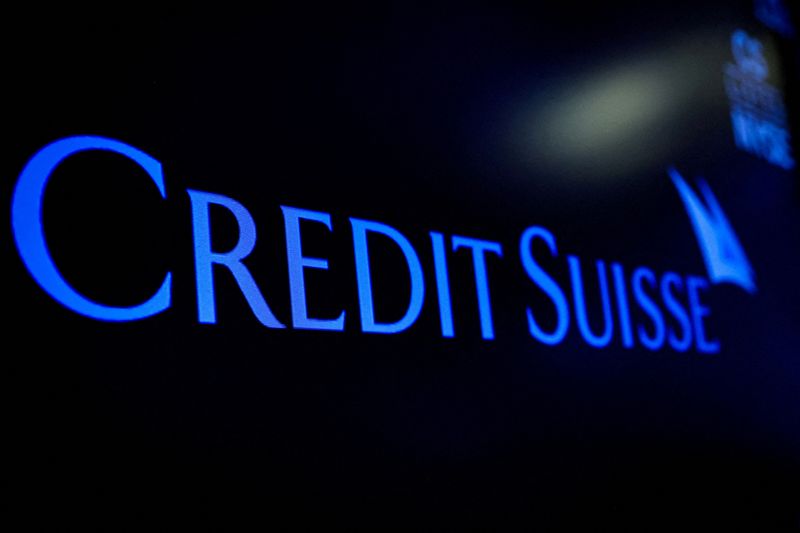By Naomi Rovnick, Nell Mackenzie and Chiara Elisei
LONDON (Reuters) - As the dust settles on a surprise move by Switzerland to write down $17 billion of bonds under Credit Suisse's rescue, the market for debt designed as a shock absorber for banks faces a long haul to regain investor trust.
The global $275 billion market for Additional Tier 1 (AT1) bonds, part of bank capital buffers that insulate taxpayers from funding bail-outs, was rocked by the Swiss authorities' decision on March 19 on Credit Suisse AT1s.
Some investors, for instance hedge funds, see an opportunity after sharp price falls over the last week.
And while prices have stabilised, many others suspect further pain ahead with the cost to banks of issuing this debt becoming so expensive that the market, viewed by regulators as integral to banking sector resilience, could wither.
Eric Larsson, managing director at asset manager Alcentra, said the market would become "bifurcated". Well-capitalised banks, he added, will be able to issue AT1s, paying investors the higher returns demanded, while smaller ones "get temporarily, potentially shut out".
If small lenders are unable to tap the AT1 market, they will likely face higher funding costs in other capital instruments which could reduce the amount they can lend, in turn raising recession risks for countries, especially in Europe whose banks dominate the AT1 sector.
Concern that banks will be unable to sell AT1 debt has weighed on share prices, with European banking stocks down 13% in March in their biggest monthly drop in two years.
"The AT1 market is hurting and while it's hurting, you won't see any new issuance," said Mark Holman, partner at TwentyFour Asset Management, noting that current yields were too high for banks to issue at.
Graphic: CoCo crisis, https://www.reuters.com/graphics/GLOBAL-MARKETS/zjvqjnlkdpx/chart.png The average yield on AT1 bonds in Europe has jumped to around 14.5% from just over 7% in February, data from index provider ICE (NYSE:ICE) show.
Credit Suisse AT1 bondholders get nothing under the UBS merger deal. Shareholders, who usually rank below bondholders in terms of who gets paid when a bank collapses, receive $3.23 billion.
Any more bondholder wipeouts ahead of shareholders would "bring into question the whole point of this asset class", said Keith Thomas, head of securities litigation at London law firm Stewarts.
Thomas said that like other finance lawyers, he has been dealing with enquiries from Credit Suisse AT1 bondholders about whether to pursue litigation over the Swiss ruling.
European regulators have said they would continue to impose losses on shareholders first if a bank fails, helping calm panicked investors. Hong Kong and Singapore also said they would stick to the traditional hierarchy of insolvency claims.
ING analysts said it was "doubtful" banks would be able to issue new AT1s "anytime soon" even with the reassurances from European regulators.
"The rule book (was) kind of torn up," said Russell Investments' head of fixed income, Gerard Fitzpatrick, adding that "a lot of people will feel fear and will move out" of AT1s.
Graphic: AT1 bank bond prices, https://fingfx.thomsonreuters.com/gfx/mkt/klvygqygkvg/AT1s3003.png SHOCK ABSORBER
AT1s, also known as "contingent convertibles" or "CoCos", were introduced after the 2008 financial crisis to act as shock absorbers if bank capital levels fell below a certain threshold. They can be converted into equity or written off and are considered a high-risk form of bank debt.
Their prices have recovered but remain well below levels seen before the Swiss decision.
A WisdomTree exchange traded fund that tracks a broad index of bank AT1s, has dropped 11% in the past fortnight. Credit Suisse AT1s made up less than 3% of the fund just before the Swiss bank's rescue, the asset manager disclosed.
Deutsche Bank (ETR:DBKGn) AT1 debt is trading at 74 cents on the dollar, off last week's lows around 67 cents but still below levels seen before the Credit Suisse writedown, Tradeweb data shows. It's a similar case with UBS AT1s, trading around 64 cents.
Investors were now watching closely whether banks would refinance AT1s when the first available date for them to do so nears. Not doing so would be a negative signal for the market, they added.
Italy's UniCredit , for instance, has asked European Central Bank supervisors if it can redeem a 1.25 billion euro ($1.36 billion) perpetual bond at the first opportunity in June, a source told Reuters.
Some AT1 investors were hopeful.
The bonds have never been as cheap compared to equity, Bjoern Jesch, global chief investment officer at DWS said in a research note.
Peter Doherty, head of investment research at London private bank Arbuthnot Latham, said the group had added more European AT1 exposure to clients' portfolios in the last week.
The Credit Suisse scare had left "the remaining banks with very high yields", Doherty said, adding he believed it unlikely that more major European banks would fail because the industry remains well capitalised.
($1 = 0.9216 euros)
